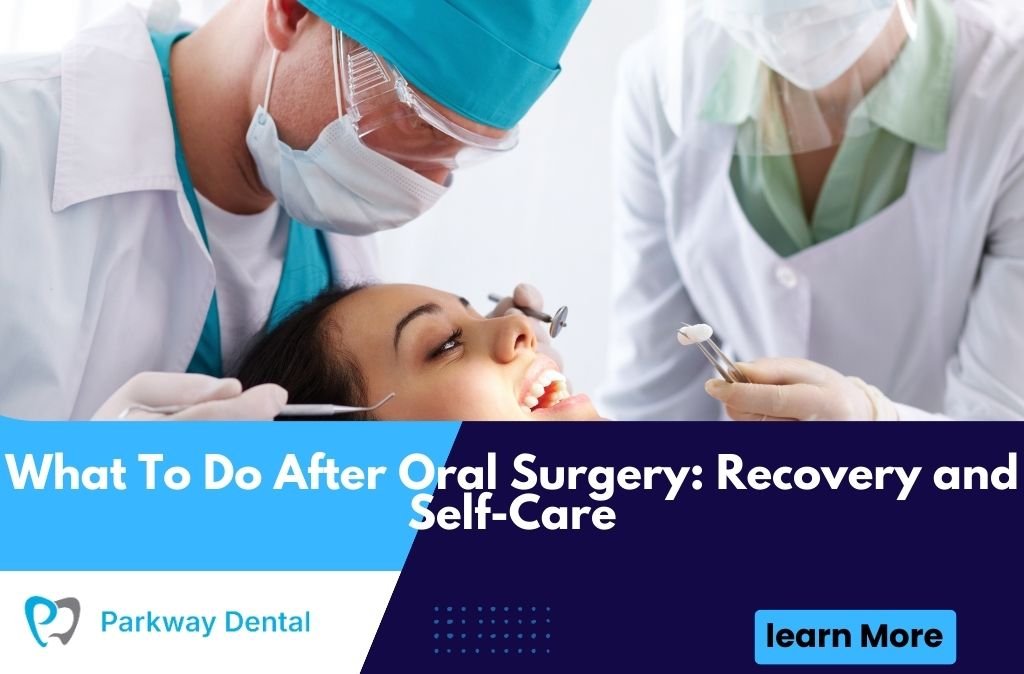Oral surgery can feel intimidating, whether it’s for tooth extraction, wisdom teeth removal, dental implants, or gum surgery. The procedure itself is only half the journey—the real challenge often comes during recovery. Knowing what to do after oral surgery helps minimize pain, prevent complications, and speed up healing.
This detailed guide will walk you through the essential recovery and self-care steps after oral surgery, from the first 24 hours to long-term healing, so you know exactly what to expect and how to take care of yourself.
Why Recovery After Oral Surgery Matters
A successful surgery depends not only on the procedure but also on how you care for your mouth afterward. Proper oral surgery recovery ensures faster healing and reduces the risk of infections, swelling, or dry socket.
Common Oral Surgeries That Require Recovery
- Tooth extractions (including wisdom teeth)
- Root canal surgery or apicoectomy
- Dental implant placement
- Gum grafting or periodontal surgery
- Jaw surgery for alignment
Each procedure has unique recovery needs, but general self-care principles apply across most oral surgeries.
The First 24 Hours After Oral Surgery
The first day after your procedure is the most critical. Your actions during this period can set the tone for the rest of your recovery.
Rest and Limit Activity
After surgery, your body needs energy to heal. Resting prevents excessive bleeding and minimizes discomfort. Avoid strenuous exercise, bending, or heavy lifting during this time.
Control Bleeding
Gauze placed on the surgical site helps control bleeding. Bite gently but firmly for 30–45 minutes, replacing gauze as directed by your dentist.
Manage Pain and Swelling
Swelling peaks within the first 48 hours. Applying a cold compress for 15 minutes on and off reduces inflammation. Over-the-counter or prescribed pain medication should be taken as directed.
Eating and Drinking After Oral Surgery
Your diet plays a major role in recovery. Eating the wrong foods can disrupt healing, while the right foods promote comfort and faster recovery.
Foods to Avoid
- Hard, crunchy, or spicy foods that may irritate the surgical site
- Hot beverages, which can dislodge blood clots
- Dairy immediately after extraction, which may slow clot formation for some patients
Best Foods for Recovery
- Soft foods like mashed potatoes, yogurt, or applesauce
- Smoothies (without seeds or straws)
- Broths and lukewarm soups
- Scrambled eggs and oatmeal
Oral Hygiene During Recovery
Keeping your mouth clean after oral surgery is vital, but brushing and rinsing need to be done carefully.
Brushing and Flossing
Avoid brushing near the surgical site for the first 24 hours. Afterward, gently brush with a soft-bristled toothbrush, being careful not to disturb stitches or clots.
Mouth Rinses
Do not rinse on the first day. From day two, use a warm saltwater rinse several times a day, especially after meals, to prevent infection.
Managing Swelling and Discomfort
Swelling and soreness are natural after oral surgery, but they can be managed effectively.
Cold Compress for the First 48 Hours
An ice pack applied to the outside of the cheek in intervals reduces swelling.
Switch to Heat After 48 Hours
A warm compress can then improve blood circulation and relieve stiffness.
Pain Relief
Non-prescription pain relievers like ibuprofen help reduce both swelling and discomfort. If prescribed medication is given, follow your dentist’s instructions closely.
Rest and Sleeping Positions
Rest is critical, but how you rest also matters.
Elevate Your Head
Sleeping with your head elevated helps minimize swelling and throbbing pain. Use two pillows or a wedge to stay propped up.
Avoid Lying Flat or on the Surgical Side
This prevents pressure and reduces the risk of bleeding or discomfort.
Physical Activity After Oral Surgery
Physical activity should be limited for several days after surgery to protect healing.
Why Exercise Can Delay Recovery
Exercise raises blood pressure and may cause bleeding or slow down clot formation.
Safe Activities During Recovery
- Gentle walking after 48 hours is usually safe
- Avoid bending, heavy lifting, or intense workouts for at least a week
Preventing Dry Socket and Infections
One of the biggest risks after tooth extraction is dry socket, a painful condition caused when the blood clot becomes dislodged.
How to Prevent Dry Socket
- Do not use straws for at least a week
- Avoid smoking or vaping
- Stick to soft foods until cleared by your dentist
- Follow your dentist’s aftercare instructions closely
Long-Term Recovery and Self-Care
Even after the first week, some patients may take several weeks to fully recover. Long-term care ensures complete healing.
Follow-Up Appointments
Always attend your follow-up visits so your dentist can check the healing progress and remove stitches if necessary.
Continue Good Oral Hygiene
Once healed, return to normal brushing and flossing routines to keep your teeth and gums healthy.
Watch for Warning Signs
Seek dental help immediately if you notice:
- Persistent bleeding beyond 48 hours
- Severe swelling or fever
- Pus discharge from the surgical site
- Intense pain that worsens over time
Conclusion
Recovery after oral surgery requires patience, self-care, and attention to your dentist’s instructions. From resting and managing swelling to choosing the right foods and preventing complications like dry socket, every step matters. By prioritizing proper care, you can heal quickly and return to your normal routine with confidence.
For safe, professional care and guidance, always consult an experienced Dentist in West Roxbury, MA.
FAQs
What not to do after oral surgery?
Avoid smoking, drinking through straws, strenuous activity, and hard foods that can dislodge clots.
How can I speed up my oral healing?
Rest, eat soft foods, stay hydrated, and follow your dentist’s aftercare instructions.
How to take care of your mouth after oral surgery?
Use gentle brushing, warm saltwater rinses, and avoid disturbing the surgical site.
How many days should you rest after oral surgery?
Most patients need at least 2–3 days of rest before resuming normal activities.
Is walking ok after oral surgery?
Yes, light walking after 48 hours is generally safe, but avoid vigorous exercise.
Can I lay on my side after oral surgery?
It’s best to avoid lying on the surgical side to reduce pressure and discomfort.
Can I bend over after oral surgery?
Avoid bending over for the first few days to prevent increased blood flow and bleeding.
Why no dairy after tooth extraction?
Dairy can sometimes interfere with clotting and promote bacterial growth immediately after surgery.
Can you leave gauze in your mouth for too long?
No, change gauze every 30–45 minutes or as directed by your dentist.
How to sleep first night after tooth extraction?
Sleep with your head elevated to reduce swelling and bleeding.
What can I use instead of gauze in my mouth?
A clean, damp tea bag can be used as a substitute if gauze is unavailable.
How to swallow to avoid dry socket?
Swallow gently and avoid spitting forcefully. Take small sips of water to stay hydrated without disrupting clots.






